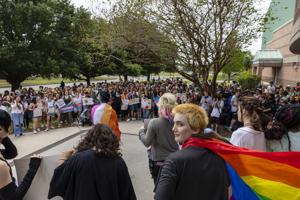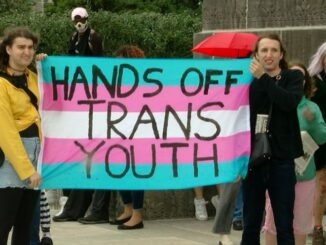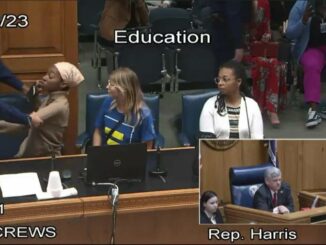
Over furious objections, bills that would ban discussion of gender and sexual identity in Louisiana classrooms and force teachers to use certain pronouns to address students cleared a key hurdle in the state legislature Thursday, advancing amid a proliferation of similar legislation in statehouses nationwide.
Modeled after so-called “Don’t Say Gay” legislation enacted in Florida, State Rep. Dodie Horton’s House Bill 466 came before Louisiana’s legislature last year but was killed then by the House Education Committee. On Wednesday, the same panel approved the bill on a 7-5 vote, sending it to the full House.
Horton described the bill, which would apply to classroom and extracurricular settings for students in kindergarten through 12th grade, as an effort at preserving parents’ rights.
“Parents have the paramount right to raise their children according to their own values and traditions,” the Haughton Republican told education committee members.
The committee also approved House Bill 81, which would require public school employees to use names and pronouns on students’ birth certificates unless parents provide written permission to do otherwise. But employees who disagree with using other pronouns because of religious or moral convictions would not be required to do so at all, the bill states.
A handful of preachers and conservative activists supported both measures, saying they would preserve what they described as traditional Christian values. But in testimony lasting more than five hours, dozens of advocates, LGBTQ+ people and teachers said the bills were an erosion of LGBTQ+ rights, saying they would further isolate an already vulnerable group of young people and increase their risk of suicide.
HB 466 appears to outlaw student organizations like gay-straight alliances, argued Mel Manuel, a transgender public school teacher from Madisonville who is running for Congress. Manuel said the bill would also force LGBTQ+ teachers to shield their identities from students.
“It’s clear when we’re talking about parents’ rights, we actually mean parents who are anti-LGBTQ, and when we talk about protecting children, we actually mean attempting to make straight children ignorant of the existence of the LGBTQ community,” Manuel told the education committee.
Law enforcement removed at least one person from the State Capitol following outbursts in the committee room, and later cited that person for causing a public disturbance, a State Police spokesperson said. Additional details were not available.
As the panel adjourned in the afternoon, observers shouted “F**k you!” and “Cowards!” at lawmakers.
The committee’s approval of the two bills comes amid a growing number of laws affecting LGBTQ+ rights nationwide. In Florida, Gov. Ron DeSantis’ administration has expanded the state’s law that bans talk of gender and sex — which critics have dubbed the “Don’t Say Gay” law — as part of the Republican’s aggressive conservative agenda, with the governor leaning heavily into cultural divides ahead of his looming White House candidacy.
And as the House Education Committee met in Baton Rouge on Wednesday, lawmakers in Montana barred transgender legislator Zooey Zephyr from the state’s House floor after Zephyr said colleagues who voted to ban gender-affirming care for youth would have “blood” on their hands.
Louisiana had previously averted some of the most heated culture-war debates over LGBTQ+ rights taking hold in other legislatures; lawmakers here killed efforts to ban gender-affirming care for trans youth last year, along with the earlier version of Horton’s anti-LGBTQ+ legislation.
But the bill targeting gender-affirming care was brought back this year by Rep. Gabe Firment, a Pollock Republican. It has yet to be considered. An array of new bills targeting sexually explicit materials in libraries — many of which feature LGBTQ+ themes — are also slated for hearings later in the session.
Specifically, Horton’s proposal would disallow discussion at schools of sexuality and gender identity “in a manner that deviates from state content standards or curricula developed or approved by the public school governing authority,” the proposal reads. It would bar teachers and school employees from discussing their personal sexual orientation or gender identity.
Fifty-two people testified against that proposal, including a teacher who spoke about how she feared her LGBTQ+ students would struggle without support; a mother who described how her child benefited from being able to discuss their sexuality with supportive teachers; and a member of the state Board of Elementary and Secondary Education, Belinda Davis, who read a list of questions from teachers worried about how the rules would affect day-to-day lesson planning.
One teacher was confused about how a lesson about Nazi Germany’s persecution of gay people would fit under the law.
Another described lessons they had taught about Sally Ride, widely known as the first openly LGBTQ+ astronaut. They worried the lesson would not be allowed because of Ride’s sexuality.
“I don’t know how to answer (these) questions from teachers,” Davis said.



Leave a Reply